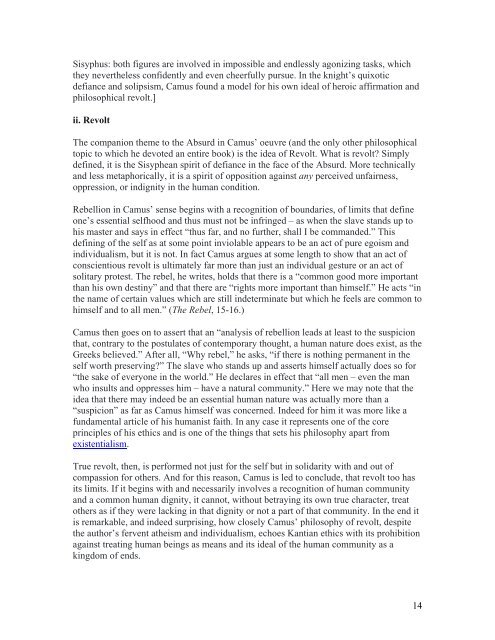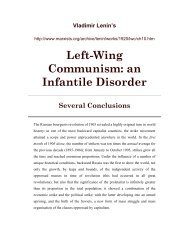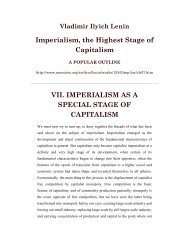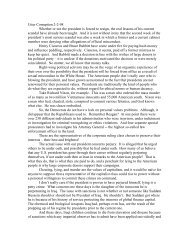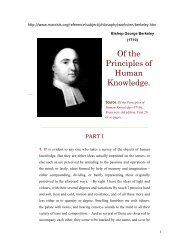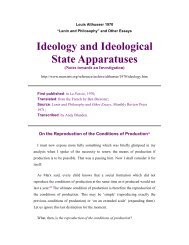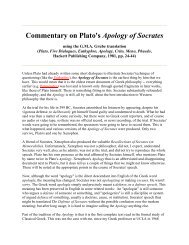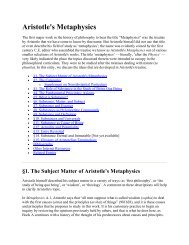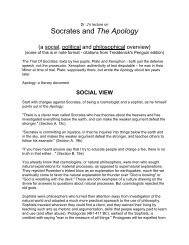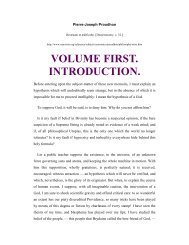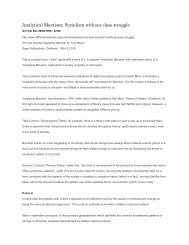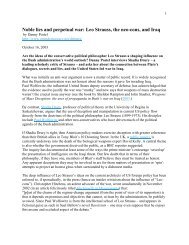Albert Camus (1913â1960) - Richard Curtis
Albert Camus (1913â1960) - Richard Curtis
Albert Camus (1913â1960) - Richard Curtis
You also want an ePaper? Increase the reach of your titles
YUMPU automatically turns print PDFs into web optimized ePapers that Google loves.
Sisyphus: both figures are involved in impossible and endlessly agonizing tasks, which<br />
they nevertheless confidently and even cheerfully pursue. In the knight’s quixotic<br />
defiance and solipsism, <strong>Camus</strong> found a model for his own ideal of heroic affirmation and<br />
philosophical revolt.]<br />
ii. Revolt<br />
The companion theme to the Absurd in <strong>Camus</strong>’ oeuvre (and the only other philosophical<br />
topic to which he devoted an entire book) is the idea of Revolt. What is revolt? Simply<br />
defined, it is the Sisyphean spirit of defiance in the face of the Absurd. More technically<br />
and less metaphorically, it is a spirit of opposition against any perceived unfairness,<br />
oppression, or indignity in the human condition.<br />
Rebellion in <strong>Camus</strong>’ sense begins with a recognition of boundaries, of limits that define<br />
one’s essential selfhood and thus must not be infringed – as when the slave stands up to<br />
his master and says in effect “thus far, and no further, shall I be commanded.” This<br />
defining of the self as at some point inviolable appears to be an act of pure egoism and<br />
individualism, but it is not. In fact <strong>Camus</strong> argues at some length to show that an act of<br />
conscientious revolt is ultimately far more than just an individual gesture or an act of<br />
solitary protest. The rebel, he writes, holds that there is a “common good more important<br />
than his own destiny” and that there are “rights more important than himself.” He acts “in<br />
the name of certain values which are still indeterminate but which he feels are common to<br />
himself and to all men.” (The Rebel, 15-16.)<br />
<strong>Camus</strong> then goes on to assert that an “analysis of rebellion leads at least to the suspicion<br />
that, contrary to the postulates of contemporary thought, a human nature does exist, as the<br />
Greeks believed.” After all, “Why rebel,” he asks, “if there is nothing permanent in the<br />
self worth preserving?” The slave who stands up and asserts himself actually does so for<br />
“the sake of everyone in the world.” He declares in effect that “all men – even the man<br />
who insults and oppresses him – have a natural community.” Here we may note that the<br />
idea that there may indeed be an essential human nature was actually more than a<br />
“suspicion” as far as <strong>Camus</strong> himself was concerned. Indeed for him it was more like a<br />
fundamental article of his humanist faith. In any case it represents one of the core<br />
principles of his ethics and is one of the things that sets his philosophy apart from<br />
existentialism.<br />
True revolt, then, is performed not just for the self but in solidarity with and out of<br />
compassion for others. And for this reason, <strong>Camus</strong> is led to conclude, that revolt too has<br />
its limits. If it begins with and necessarily involves a recognition of human community<br />
and a common human dignity, it cannot, without betraying its own true character, treat<br />
others as if they were lacking in that dignity or not a part of that community. In the end it<br />
is remarkable, and indeed surprising, how closely <strong>Camus</strong>’ philosophy of revolt, despite<br />
the author’s fervent atheism and individualism, echoes Kantian ethics with its prohibition<br />
against treating human beings as means and its ideal of the human community as a<br />
kingdom of ends.<br />
14


